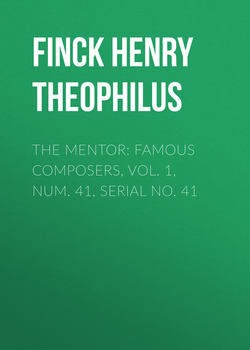The Mentor: Famous Composers, Vol. 1, Num. 41, Serial No. 41

Реклама. ООО «ЛитРес», ИНН: 7719571260.
Оглавление
Finck Henry Theophilus. The Mentor: Famous Composers, Vol. 1, Num. 41, Serial No. 41
FAMOUS COMPOSERS
CHOPIN, THE SOUL OF THE PIANO
MENDELSSOHN’S MUSICAL SUNSHINE
MENDELSSOHN’S SONGS AND CHORAL WORKS
SCHUBERT, GREATEST OF MELODISTS
SCHUBERT’S INSTRUMENTAL PIECES
SCHUMANN, CHIEF OF ROMANTICISTS
LISZT, THE MANY-SIDED
THE DYNAMIC EFFECTS OF LISZT
BRAHMS, THE CONSERVATIVE
Editorial
FRANZ LISZT
FELIX MENDELSSOHN-BARTHOLDY
FRANZ SCHUBERT
ROBERT SCHUMANN
FRÉDÉRIC FRANÇOIS CHOPIN
JOHANNES BRAHMS
Отрывок из книги
While it is generally understood that the three great musical countries are Italy, Germany, and France, it must not be forgotten that Poland revolutionized the music of the pianoforte, the most popular and universal of all instruments. That small country looms up very big indeed in the history of the piano. Paderewski, the greatest pianist of our time, and one of the best composers (although his day as such has not yet come), is a Pole, and so is the pianist who ranks next to him, Josef Hofmann. Karl Tausig, in his day, was a piano giant; while three other Poles are well known to all music-lovers of our time,—Moszkowski and the Scharwenka brothers, all of them composers for the same instrument.
This is true particularly of his polonaises and his mazurkas. Polonaises seem to have been played originally at the coronation of Polish kings when the aristocrats were marching past the throne; while the mazurkas were quaint old folk dances. In Chopin’s pieces the aristocratic and the folk elements are artistically blended, and that is one of their principal charms. Like Luther Burbank’s wonderful new fruits, they unite the raciness of the soil with the qualities of his own creative genius.
.....
His splendid sonatas were for a long time underrated, because he refused to cut them according to traditional patterns; but in these days of musical free thinking we laugh at such objections and applaud his sonatas as much as his short pieces.
While the public loves Chopin for the reasons hinted at, experts hold him in highest honor also because he discovered the true language of the piano, which all the composers who came after him had to learn to speak. By his ingenious use of the pedal to combine “scattered” tones into chords he revealed an entirely new world of ravishing tone colors of extraordinary richness and variety. Quite new, too, were the dainty ornamental notes that here and there bedew his melodies like an iridescent spray. He created not only a new style of playing, but also pieces of new patterns, or forms; whereas most of even the greatest masters had contented themselves with accepted traditional forms and simply enlarging or improving them.
.....